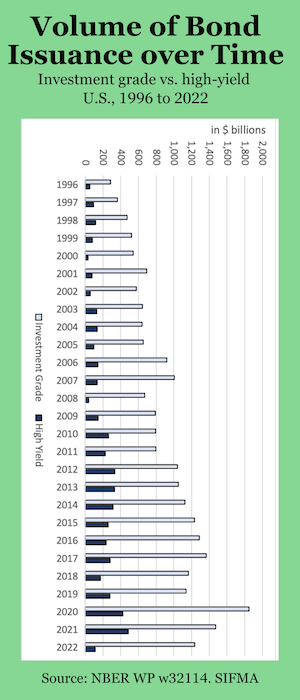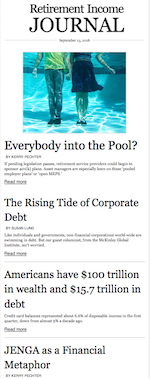Millennials ‘defy stereotypes’: T. Rowe Price
“Millennials,” ages 18 to 35 or so, now represent about a third of the U.S. population. Partly because they now have economic clout, and are starting to save for retirement—and partly because they’re America’s first truly digital cohort—the financial services industry is keen to understand them.
That’s why we’re seeing more studies that compare and contrast the financial habits of the Milllennials and their parents, the Baby Boomers. T. Rowe Price, the no-load mutual fund company and retirement plan provider, for instance, has just issued a survey of 1,505 Millennials and 514 Boomers called the “Retirement Saving and Spending Study.”
“Millennials with 401(k)s have relatively good financial habits, particularly when compared with a national sample of 514 baby boomers with 401(k)s,” a release about the new report said. “While Millennials are not saving at least 15% of their annual salary for retirement, as T. Rowe Price recommends, they recognize that saving for retirement is important and are interested in saving more.”
Millennials, according to their own testimony, tend to track their expenses more than Boomers do (75% vs. 64%), are more likely to stick to a budget (67% to 55%), and were more likely to have increased their retirement savings within the past 12 months (40% vs. 21%), the T. Rowe Price survey showed. Millennials ranked contributing to a 401(k) but below the match and paying down debt equally as their top priority.
“They are exhibiting financial discipline in managing their spending and are defying stereotypes that this generation is prone to spend-thrift, short-sighted thinking,” said Anne Coveney, senior manager of Retirement Thought Leadership at T. Rowe Price.
In other survey findings:
- Millennials are saving nearly as high a percentage of salary as baby boomers.
- More millennials have increased their 401(k) savings this year than baby boomers.
- More Millennials wish their employers auto-enrolled them in 401(k)s at a higher savings rate.
- Millennials want advice and are more likely to use robo-advisors.
- They fund emergencies differently.
- Millennials profess to live within their means and to save by any means necessary.
- They are more comfortable saving extra money than spending it.
- Their employers’ 401(k) matches largely drive saving behavior.
- Most are better off financially than their parents were at the same age.
- Saving for retirement and paying down debt are equally important.
- Most Millennials expect Social Security to go bankrupt before they retire.
- Millennials are satisfied with auto-enrollment.
- Auto-enrollment rates can be set higher.
- Millennials want their employers’ full contribution match.
- But some are reluctant to save at higher rates.
- Millennials understand that target date funds hold a mix of asset classes.
- But they may not have a full appreciation of all risks.
- And they do not understand that these funds offer one-stop diversification.
- Women are less likely to save in 401(k)s.
- And when they do save, they save less than men.
- Non-savers make less money and have more student debt.
- Their educational attainment is the same as those who are saving.
- It is difficult for non-savers to meet their monthly expenses.
The T. Rowe Price research was based on online interviews with 3,026 working adults age 18+ who are currently contributing to a 401(k) plan or are eligible to contribute and have a balance with their current employer of $1,000 or more. Additionally, 255 Millennials (ages 18–33) who are eligible for a 401(k) at their current employer but not contributing and do not have a balance in that 401(k) were surveyed. Retirees are represented by 1,027 adults who have retired in the past one to five years and who have a Rollover IRA or an account balance in a left-in-plan 401(k) plan. Interviewing was conducted during February 19 through March 25, 2015. All three samples are subject to a margin of error of just under 3%.
Interest rates will stay low for years: PIMCO
Institutional investors are likely to continue to have to search for alternatives to traditional bonds in the years to come, according to the results of PIMCO’s latest Secular meeting on the long-term economic outlook, held each May, IPE.com reported.
PIMCO’s analysts predicted that the neutral, real base rate for government bonds in developed countries would hover around 0% over the next 3-5 years, once central banks found the “right level” to balance out investments and savings.
“We have probably seen the bottom of the trough regarding interest rates in Europe now,” said Andrew Bosomworth, managing director, PIMCO Germany.
PIMCO’s analysts estimated that basic yield would only be increased by an inflation premium, most likely the 2% set by the European Central Bank as target inflation, and a duration premium of 0.5-1% for 10-year-bonds on average.
Nevertheless, Joachim Fels, managing director and global economic advisor at PIMCO, said he did not anticipate a “great rotation” from bonds into equities, predicted by many in the current low-interest-rate environment. “Some investors shifted a part of their portfolios into equities, but volatility remains a problem for many,” he said.
Bosomworth added that not all companies could “get money on the stock markets”, while governments had to continue to issue bonds. He pointed out that, even with low interest rates, there was still demand for government debt because of its safety.
Schwab introduces RIA version of its Intelligent Portfolios program
Charles Schwab has launched an automated investment management platform for registered investment advisors. Called Institutional Intelligent Portfolios and sponsored by Schwab Wealth Investment Advisory, Inc., it’s a white-label web-based platform that allows individual RIAs to leverage some of the digital capabilities that the robo-advisors have created.
“Institutional Intelligent Portfolios offers RIA firms flexibility across portfolio construction, ETF selection, and branding for their client experience,” a Schwab release said. RIAs can use the platform to build portfolios from more than 450 exchange-traded fund in 28 asset classes from all major fund families.
Once advisory clients establish accounts on the Schwab platform, the accounts can be automatically enrolled, with the advisor’s client’s agreement, for electronic delivery of trade confirmations, statements, communications and other documents, and advisors’ clients can access their account using Schwab Alliance or through a dedicated website and mobile app, Schwab’s release said.
Institutional Intelligent Portfolios accounts will be displayed in Schwab Advisor Center (Schwab’s desktop client management system for RIAs), alongside the advisor’s other client accounts. Data on Institutional Intelligent Portfolios accounts will be available for download through Schwab Data Delivery to use in advisors’ portfolio management systems, including those offered through Schwab Performance Technologies such as PortfolioCenter, Schwab’s portfolio management tool for advisors. Users of Schwab OpenView Gateway also will be able to access real-time information on these accounts through all participating third-party applications.
The program’s pricing structure is based on total assets custodied with Schwab outside of the Institutional Intelligent Portfolios program. For advisors with less than $100 million in assets under management (AUM) with Schwab, there will be a 10 basis point platform fee. For those firms who maintain more than $100 million in AUM at Schwab, there will be no fee. Schwab charges no account service fees, trading commissions or custody fees to advisors’ clients.
Today’s target-date funds are outdated: AllianceBernstein
AllianceBernstein, the investment management firm that is 62.7% owned by AXA, has released a whitepaper called “Designing the Future of Target-Date Funds: A New Blueprint for Improving Retirement Outcomes.”
“Today’s target-date funds fail to incorporate institutional-quality investment solutions and fiduciary best practices that are commonplace across most large, professionally managed portfolios,” AllianceBernstein said in a release. “Despite the new tools available to target-date funds, most retirement plans are still using traditional portfolio designs developed years ago.”
Many target-date strategies use a single-manager approach, focus only on stocks and bonds, have a limited static allocation strategy, and stick entirely with active or passive investing approaches rather than mixing the best of both, the whitepaper says.
“We’re looking to provide a target-date design of tomorrow that utilizes a multi-manager, open architecture structure, incorporates a broader collection of diversifying assets and that can dynamically adjust the glide path according to market conditions,” said Dan Loewy, chief investment officer and co-head of multi-asset solutions at AllianceBernstein, in the release.
Bank of America Merrill Lynch to sponsor RIIA webinars
The Retirement Income Industry Association has announced that Bank of America Merrill Lynch will underwrite the organization’s 2015-2016 calendar of adviser- and retirement industry-focused webinars as sole sponsor of its Virtual Learning Center.
The twice monthly webinars, offered free to the retirement industry, press and advisers, provide perspective from industry thought leaders on retirement income planning challenges, strategies, products and technologies. This is the third year that Bank of America Merrill Lynch has supported the Virtual Learning Center. Access to past webinars is available to RIIA corporate and individual members.
Launched in 2011, RIIA’s Virtual Learning Center (VLC) has been host to presentations from industry leaders including: Michael Kitces, Wade Pfau, Michael Finke, David Blanchett, Dirk Cotton, Jack Tatar, Dana Anspach, Sandra Timmermann, Mathew Greenwald, Howard Schneider, Dennis Gallant, Anna Rappaport, Milliman, New York Life Insurance Company, MassMutual, PwC, The Depository Trust & Clearing Corporation, and DST Systems, among others.
The Retirement Income Industry Association (RIIA) is a not-for-profit industry association that was started in 2005 and launched publicly in February 2006 “to discover, validate and teach the new realities of retirement and to do so from the perspective of “The View Across the Silos”, with the goal of achieving better retirement outcomes.”
More information about RIIA can be found at www.riia-usa.org.
Fidelity’s biennial “couples” study published
Most couples (72%) say they communicate “exceptionally” or “very” well about money, 43% (up from 27% in 2013) couldn’t correctly identify how much their partner makes, and 10% of those were off by $25,000 or more, according to Fidelity Investments’ 2015 Couples Retirement Study.
The biennial survey, which has been conducted since 2007, identified a number of other critical misunderstandings and knowledge gaps between couples:
- 36% of couples disagreed on the amount of the household’s investible assets.
- 48% have “no idea” how much they will need to save to maintain their current lifestyle in retirement—and 47% percent are in disagreement about the amount needed.
- 60% of couples and 49% of Boomers don’t know how much their Social Security benefit might be.
- One in three couples disagree about how comfortable their retirement lifestyle will be.
© 2015 RIJ Publishing LLC. All rights reserved.


